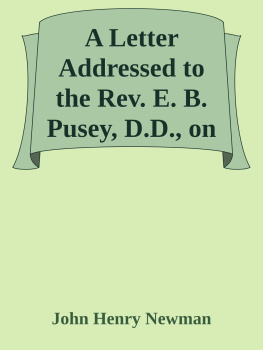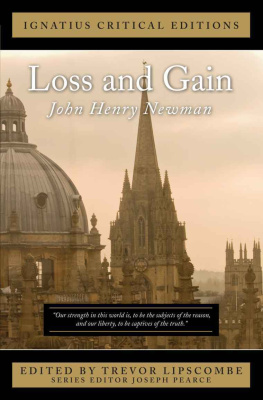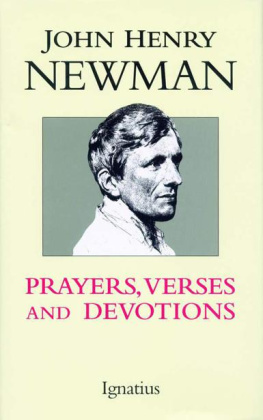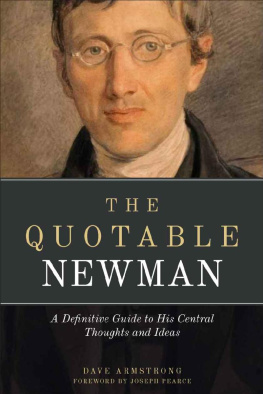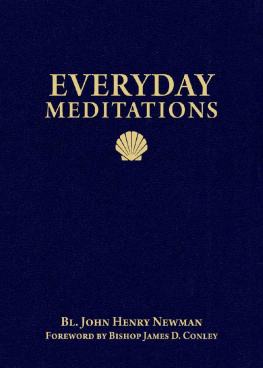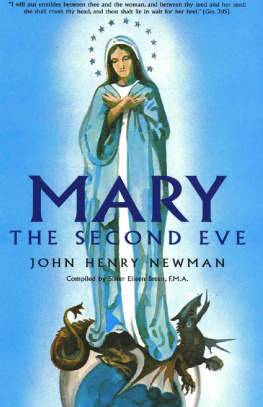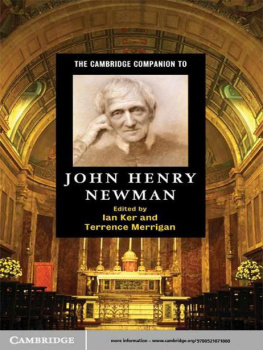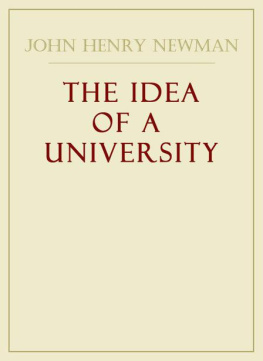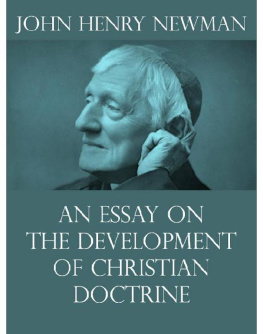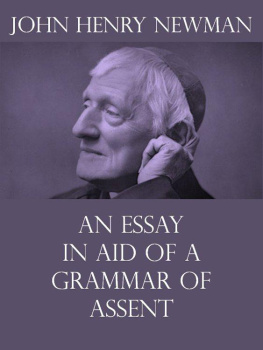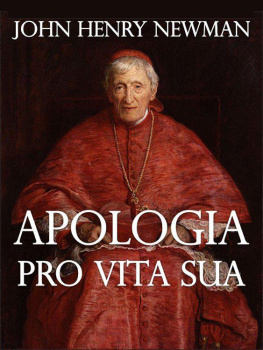Blessed John Henry Newman - Blessed John Henry Newman Collection [26 Books]
Here you can read online Blessed John Henry Newman - Blessed John Henry Newman Collection [26 Books] full text of the book (entire story) in english for free. Download pdf and epub, get meaning, cover and reviews about this ebook. year: 2016, publisher: Aeterna Press, genre: Religion. Description of the work, (preface) as well as reviews are available. Best literature library LitArk.com created for fans of good reading and offers a wide selection of genres:
Romance novel
Science fiction
Adventure
Detective
Science
History
Home and family
Prose
Art
Politics
Computer
Non-fiction
Religion
Business
Children
Humor
Choose a favorite category and find really read worthwhile books. Enjoy immersion in the world of imagination, feel the emotions of the characters or learn something new for yourself, make an fascinating discovery.
- Book:Blessed John Henry Newman Collection [26 Books]
- Author:
- Publisher:Aeterna Press
- Genre:
- Year:2016
- Rating:4 / 5
- Favourites:Add to favourites
- Your mark:
Blessed John Henry Newman Collection [26 Books]: summary, description and annotation
We offer to read an annotation, description, summary or preface (depends on what the author of the book "Blessed John Henry Newman Collection [26 Books]" wrote himself). If you haven't found the necessary information about the book — write in the comments, we will try to find it.
Quality Formatting and Value
Active Index, Multiple Table of Contents for all Books
Multiple Illustrations
John Henry Newman C.O., also referred to as Cardinal Newman, John Henry Cardinal Newman, and Blessed John Henry Newman, was a Catholic cardinal and theologian who was a very important figure in the religious history of England in the 19th century. He was known nationally by the mid-1830s.Originally an evangelical Oxford University academic and priest in the Church of England, Newman then became drawn to the high-church tradition of Anglicanism. He became known as a leader of, and an able polemicist for, the Oxford Movement, an influential and controversial grouping of Anglicans who wished to return to the Church of England many Catholic beliefs and liturgical rituals from before the English Reformation.
BOOKS
AN ESSAY IN AID OF A GRAMMAR OF ASSENT
AN ESSAY ON THE DEVELOPMENT OF CHRISTIAN DOCTRINE
APOLOGIA PRO VITA SUA
CALLISTA
DISCOURSES ADDRESSED TO MIXED CONGREGATIONS
DISCUSSIONS AND ARGUMENTS
ESSAYS: CRITICAL AND HISTORICAL
FAITH AND PREJUDICE
HISTORICAL SKETCHES
LECTURES: ON CERTAIN DIFFICULTIES FELT BY ANGLICANS IN SUBMITTING TO THE CATHOLIC CHURCH
LECTURES: ON JUSTIFICATION
LECTURES: ON THE PRESENT POSITION OF CATHOLICS IN ENGLAND
PAROCHIAL AND PLAIN SERMONS
SERMON NOTES
SERMONS: BEARING ON SUBJECTS OF THE DAY
SERMONS: CHIEFLY ON THE THEORY OF RELIGIOUS BELIEF
SERMONS: PREACHED ON VARIOUS OCCASIONS
STRAY ESSAYS: ON CONTROVERSIAL POINTS
THE ARIANS OF THE FOURTH CENTURY
THE IDEA OF A UNIVERSITY
THE MONTH: AN ILLUSTRATED MAGAZINE OF LITERATURE, SCIENCE, AND ART
THE VIA MEDIA OF THE ANGLICAN CHURCH
TRACTS: THEOLOGICAL AND ECCLESIASTICAL
TWO ESSAYS ON SCRIPTURE MIRACLES AND ON ECCLESIASTICAL
A LETTER ADDRESSED TO THE DUKE OF NORFOLK: ON OCCASION OF MR. GLADSTONES RECENT EXPOSTULATION
A LETTER ADDRESSED TO THE REV. E. B. PUSEY: ON OCCASION OF HIS EIRENICON
PUBLISHER: AETERNA PRESS
Blessed John Henry Newman: author's other books
Who wrote Blessed John Henry Newman Collection [26 Books]? Find out the surname, the name of the author of the book and a list of all author's works by series.

![Blessed John Henry Newman Blessed John Henry Newman Collection [26 Books]](/uploads/posts/book/371011/thumbs/blessed-john-henry-newman-blessed-john-henry.jpg)
